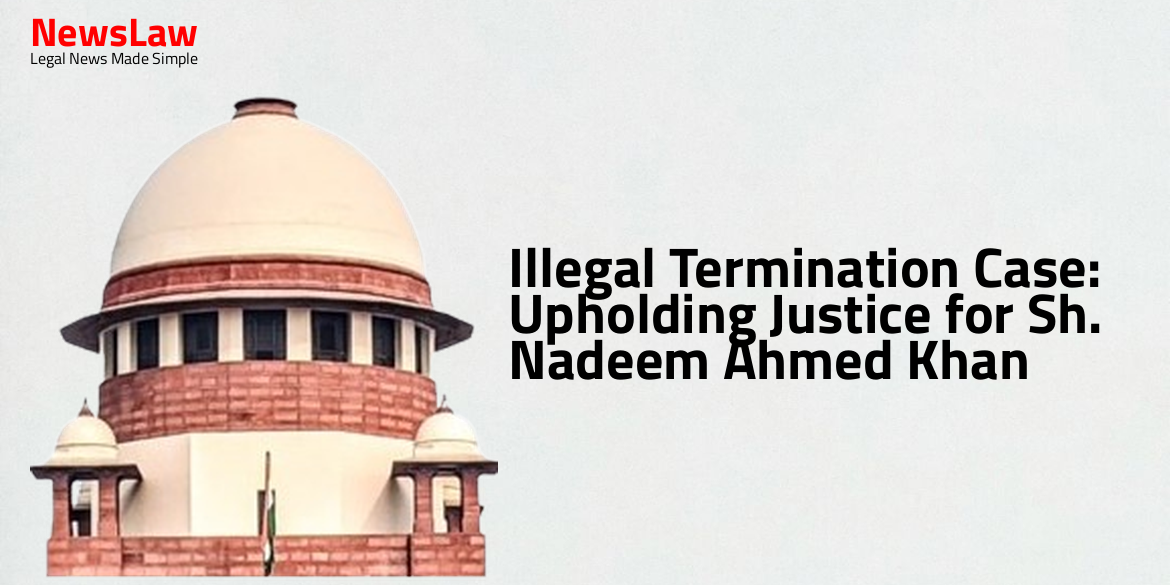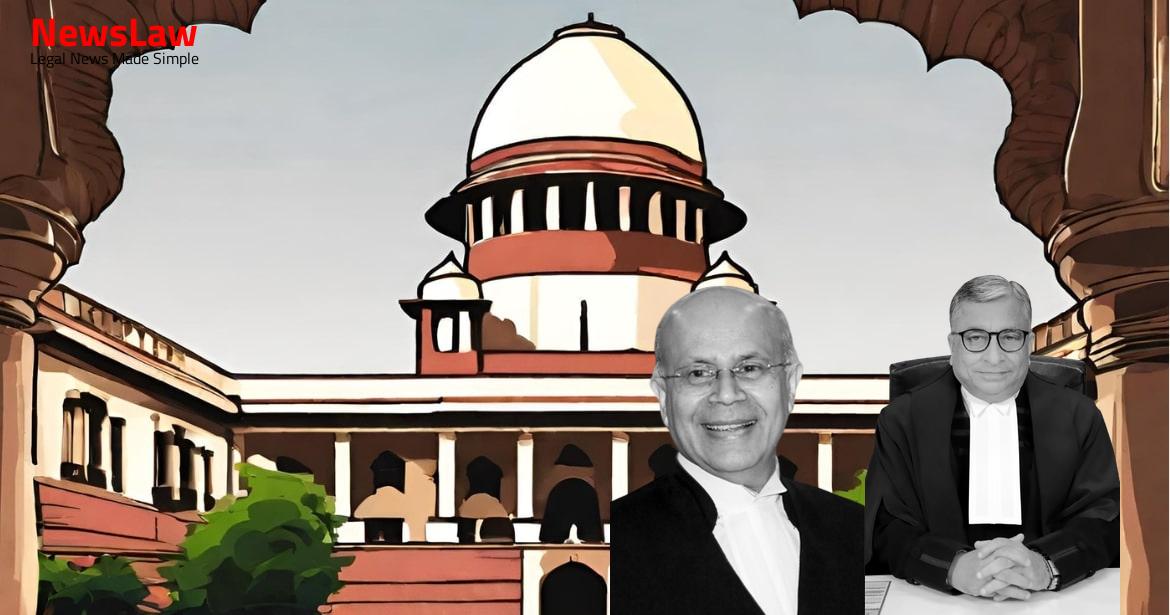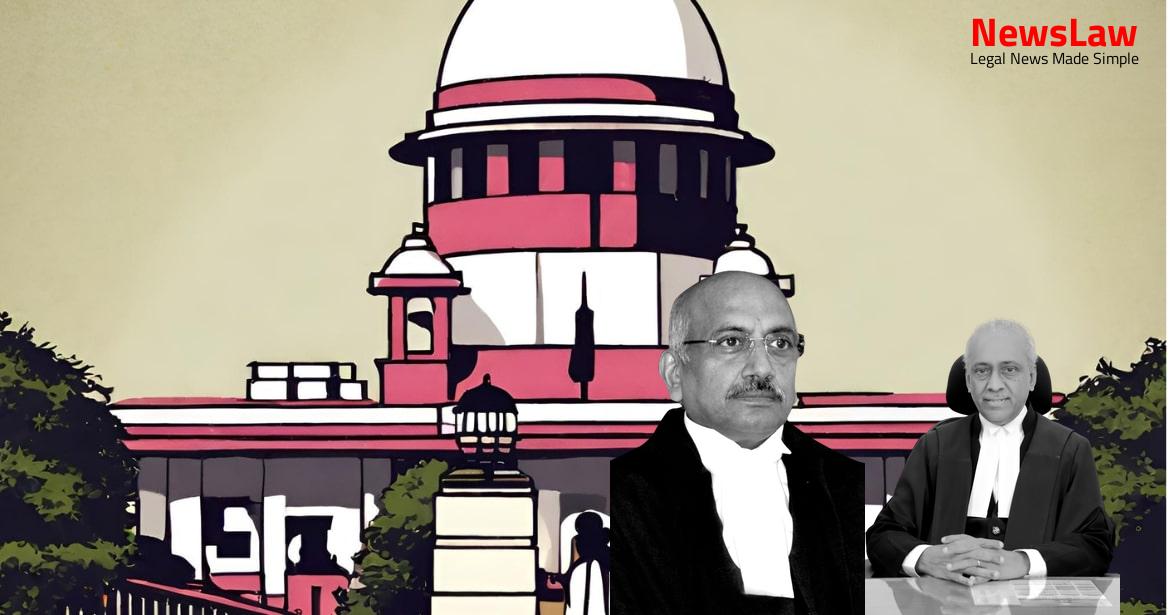In a significant legal battle, the Delhi High Court ruled in favor of justice for Sh. Nadeem Ahmed Khan in an illegal termination case. The court’s decision emphasizes the importance of upholding labor rights and ensuring fair treatment for workers like Sh. Nadeem Ahmed Khan. Let’s delve into the details of this case that sheds light on the principles of natural justice and due process in the workplace.
Facts
- The workman had over 10 years of tenure with the petitioner company.
- The management did not follow principles of natural justice by not conducting an enquiry before termination.
- The age of the workman was considered in the judgment.
- Lack of evidence presented by the management regarding the workman’s alternative employment.
Issue
- The issue before the court is whether the workman abandoned his duties as alleged by the management or if his services were terminated illegally by the management.
- Evidence presented by both parties needs to be considered to determine if abandonment or illegal termination occurred.
- The workman claimed he was transferred back and forth until one day he was told not to report to work.
- The management denied abandonment but did not provide evidence to support their claim.
- No notice, charge sheet, or letter asking the workman to return to work was issued by the management.
- The management’s approach to deeming dismissal without proper procedures goes against labor laws designed to protect workers.
- It was the management’s responsibility to conduct proper proceedings to investigate why the workman was not reporting for duty.
- The management’s failure to question the workman during cross-examination suggests the workman’s case was admitted by the management.
- Based on the legal position and facts presented, the court concludes that Sh. Nadeem Ahmed Khan’s services were terminated illegally and/or unjustifiably by the management.
Arguments
- The petitioner management contends that the respondent workman abandoned his services and was not terminated by the petitioner.
- The petitioner argues that in cases of dispute between parties, reinstatement should not be granted.
- The petitioner states that the respondent workman was directed to be deputed to Vrindavan, Mathura, but he refused and threatened litigation if transferred.
- Despite claiming sickness, the respondent did not report to duty at the project location and failed to join deputation multiple times.
- The petitioner deemed that the respondent had abandoned his duties after he repeatedly failed to join his duties.
- The learned Labour Court awarded the respondent reinstatement and 50% back wages, which the petitioner challenges as unreasonable and unsupported by evidence.
- The petitioner asserts that the respondent’s own statement about lack of alternative employment due to age renders reinstatement inappropriate.
- The petitioner argues that the burden was on the employer to establish the respondent’s excuses for not joining duty, which were invalid.
- The petitioner insists that reinstatement should not be granted as a standard rule and suggests one-time compensation instead.
- The petitioner claims that the respondent failed to plead or prove his unemployment after termination.
- The petitioner asserts that the respondent did not discharge the burden of proving otherwise in the case.
- The petitioner contends that the respondent workman does not qualify as a workman as per Section 2(s) of the Act.
- The petitioner management argues that reinstatement is unreasonable.
- They believe that lump sum compensation should be awarded instead.
- They feel that the Labour Court should have considered this alternative.
Analysis
- The workman had worked for almost 10 years with the management and was deemed dismissed without following natural justice principles.
- The burden of proof regarding the workman’s duties after termination was on the employer, not the workman.
- In cases of illegal termination, reinstatement with full back wages is the norm unless the workman was gainfully employed during the legal battle.
- Employer’s objection to the Industrial Court’s jurisdiction was dismissed for lack of evidence.
- Failure of the employer to follow due process violated provisions of the Industrial Disputes Act, leading to the granting of full back wages to the workman.
- The court emphasized the importance of the employer proving special circumstances to justify non-reinstatement or non-payment of back wages.
- The workman did not intend to abandon services, as evidenced by testimonies, leading to the justified award of full back wages by the Labour Court.
- An employee has the right to abandon service voluntarily by resigning or not joining duty.
- Reinstatement should be awarded as a matter of course when termination is found to be invalid.
- Denial of reinstatement may occur if industry has closed down.
- Doctrine of mitigation of damages does not apply in this context.
- Employer has the burden to prove that a workman had managerial duties.
- Long absence from duty may lead to voluntary abandonment of service.
- Exceptional circumstances may justify not granting full back wages upon reinstatement.
- Unauthorised absence can lead to the inference of abandonment of service.
- Termination by employer leads to reinstatement of services and back wages in most cases.
- Employee must be restored to the same position before termination if service was terminated illegally.
- No strait-jacket formula for awarding back wages; discretion of the Tribunal plays a role.
- Award of full back wages is the normal rule unless circumstances necessitate otherwise.
- Restitutionary approach should be adopted for reinstatement and award of back wages.
- Courts may deny full back wages if it places an impossible burden on the employer.
- Absence from service must be accompanied by the intent to voluntarily abandon the service.
- The Court does not find merit in the petitioner’s proposition
- The impugned award considers all facts and settled legal principles
- The Labour Court exercised its powers within the conferred jurisdiction
- No illegality found in the Labour Court’s actions
Decision
- Instant petition dismissed along with any pending application.
- Petition devoid of merit and liable to be dismissed.
- Impugned award dated 22 December, 2023 by Labour Court upheld.
Case Title: OMAXE BUILDHOME PVT LTD Vs. NADEEM AHMED KHAN (2024:DHC:4649)
Case Number: W.P.(C)-8193/2024



